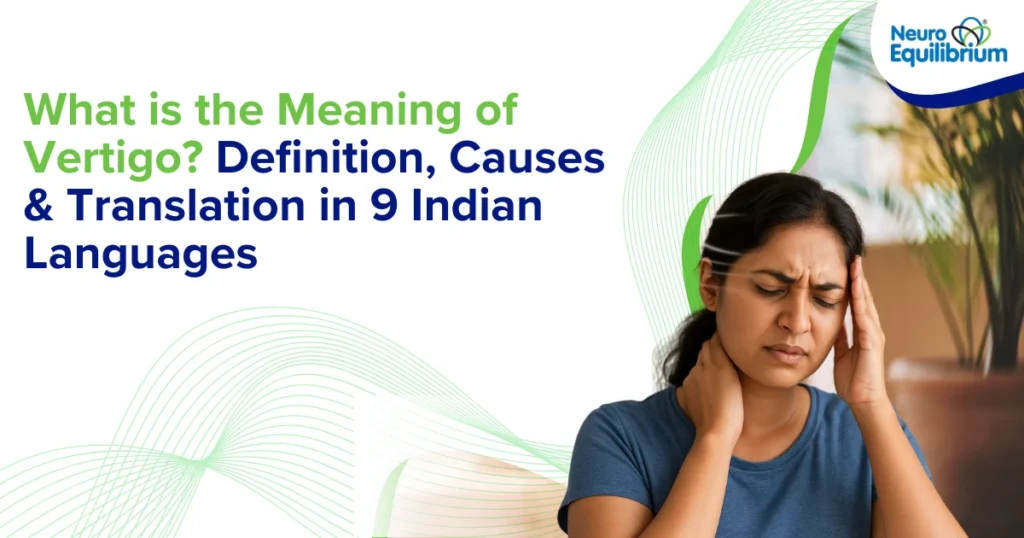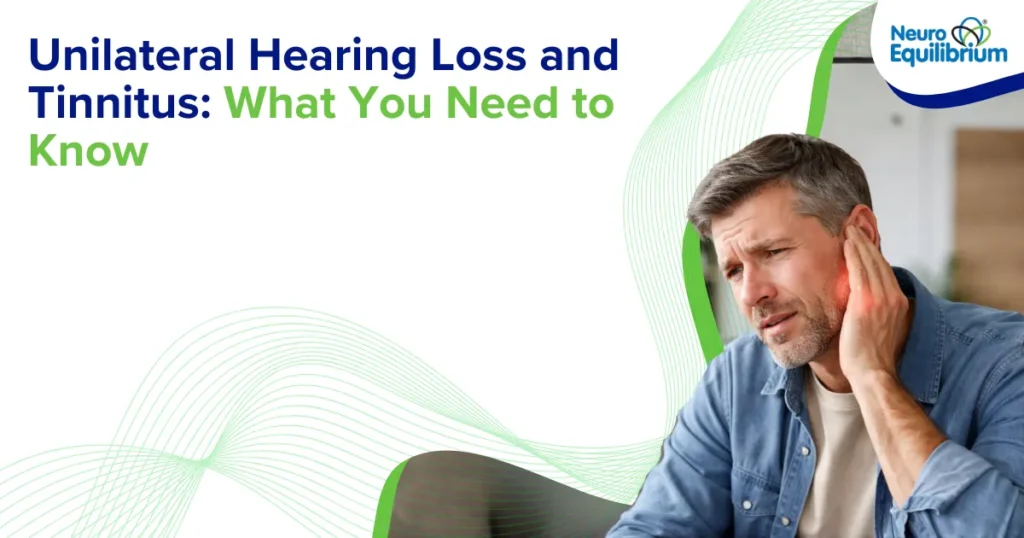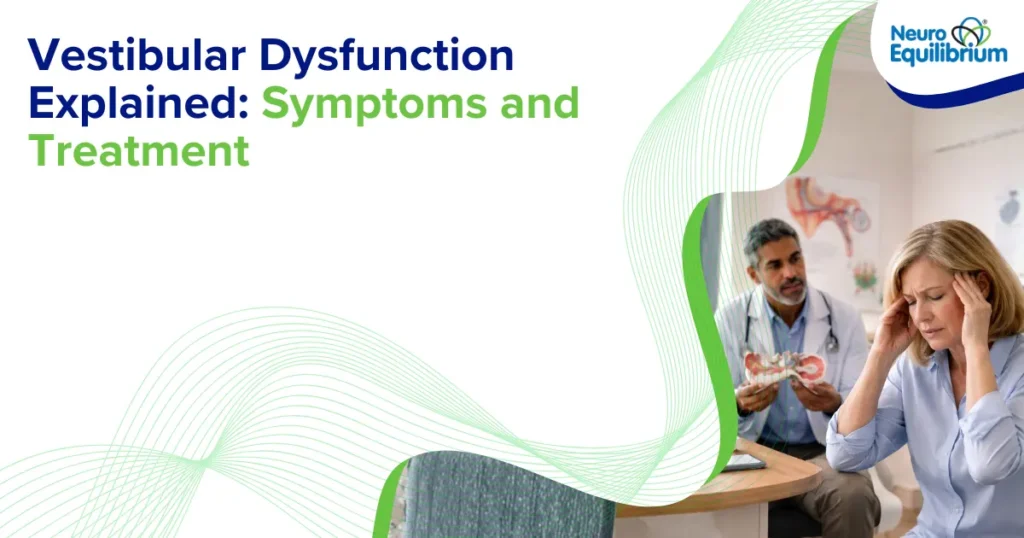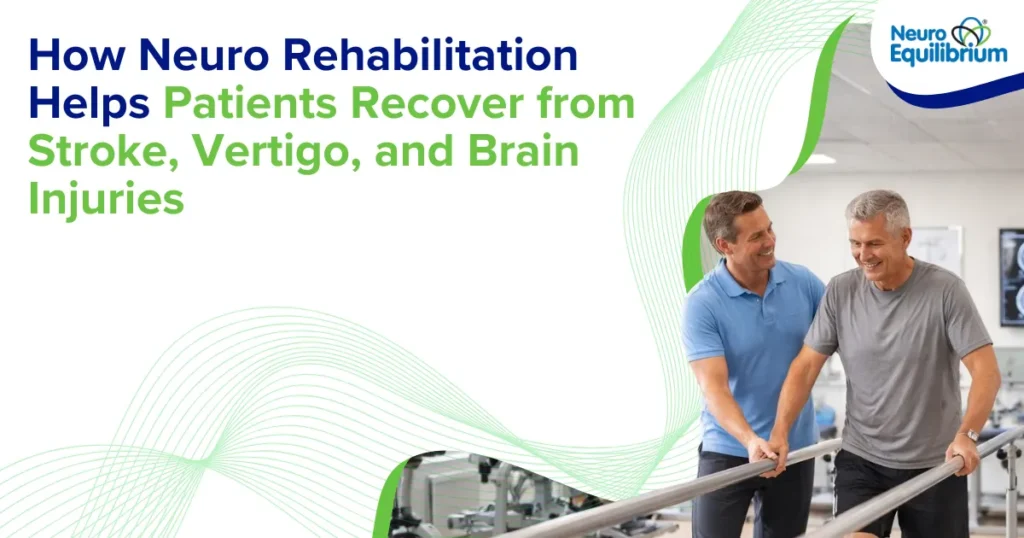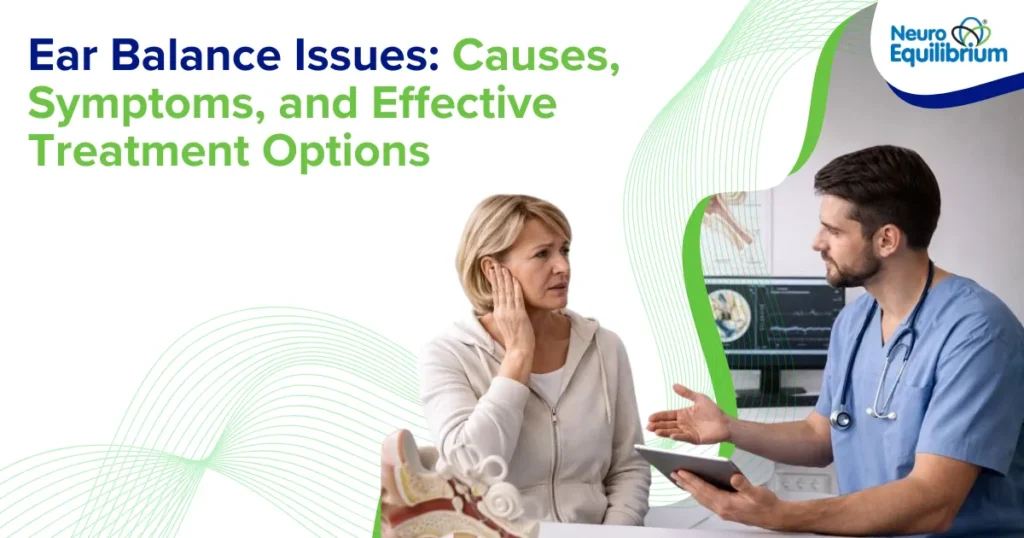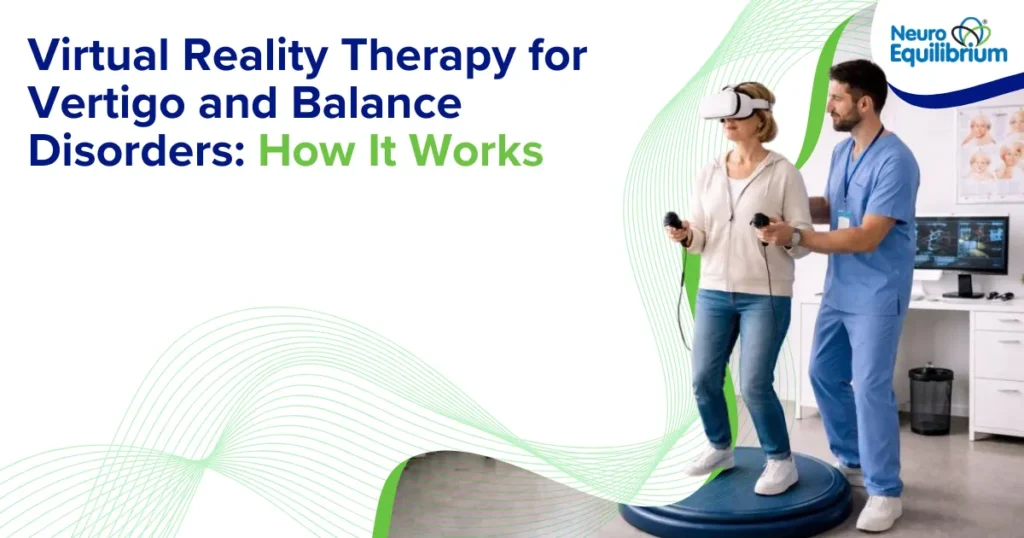You should be familiar with vertigo if you ever had an unexpected sensation that the room is turning or that the surroundings are moving even when you are standing still. It is a confusing and uneasy feeling that most individuals mistake as plain dizziness. Understanding the meaning of vertigo is the first step in determining its possible causes.
In simple terms, vertigo is the sensation that you or your surroundings are spinning, even when you’re perfectly still. It’s not a disease itself, but rather a symptom of an underlying issue, usually related to the balance systems in your inner ear or brain.
Know More About Vertigo
- Can Vertigo Be Cured Permanently? Exploring Treatment Options
- How Vertigo Is Diagnosed at NeuroEquilibrium
- Do You Need a Vertigo Specialist? When to See One & How to Choose
Vertigo Disease Meaning
People often confuse vertigo with a disease, but it’s actually a symptom indicating a possible balance issue. When folks ask about vertigo being a disease, they’re usually curious about what conditions can cause it. These can include:
- Benign Paroxysmal Positional Vertigo (BPPV): The most likely cause, here, is the dislodging of tiny crystals of calcium in your inner ear, which then give your brain confusing signals.
- Meniere Disease: a chronic ailment that is brought about by excess water in the inner ear.
- Vestibular Neuritis: Swelling of the vestibular nerve, usually caused by a viral infection.
- Migraines: Others get vertigo during a migraine attack, even without a headache.
You should also be aware of the distinction between vertigo and mere dizziness. Dizziness causes you to feel lightheaded, faint or unsteady. Vertigo is a kind of sensation of movement, a spinning, whirling, or tilting feeling.
| Feature | Vertigo | Dizziness (General) |
| Sensation | A specific feeling of spinning, whirling, rotating, swaying, or tilting of oneself or the surroundings. | A broader term, including feelings of lightheadedness, wooziness, unsteadiness, or feeling faint, without the distinct spinning sensation. |
| Primary Origin | Primarily related to the balance system in the inner ear or specific parts of the brain involved in balance control. | Can be aggravated by upright posture, body movement, or moving visual fields, and exacerbated by stress or negative thoughts. |
| Duration | Episodes are typically brief (e.g., less than a minute for BPPV). | Can be persistent or long-term. |
| Accompanying Symptoms | May include nausea, vomiting, or jerky eye movements (nystagmus). For conditions like Ménière’s, also hearing loss, tinnitus, ear fullness. | Can be accompanied by fear, hypervigilance, and avoidance behaviours (especially in chronic dizziness/PPPD). Anxiety-induced dizziness typically has no auditory symptoms. |
Vertigo Attack Meaning
A vertigo attack is an abrupt, sometimes severe, experience of vertigo. The attacks may be sudden and may last anything between a few seconds and hours.
Imagine you just got off a really fast merry-go-round at a fair. Even after you stop, it still feels like the world is spinning around you. You may need to hold onto something to keep your balance. That dizzy, spinning feeling is very close to what people experience during a vertigo attack. It can happen suddenly, even when they are just sitting or standing still.
Vertigo is not a disease but a symptom that can arise from many different conditions. The most common causes are problems in the inner ear, such as BPPV (tiny crystals moving in the ear), Ménière’s disease, or ear infections that affect balance. Brain-related conditions like migraines, rare can also trigger vertigo. Other factors such as blood pressure changes, anemia, dehydration, certain medications, stress, lack of sleep, and aging may contribute to dizziness or unsteadiness. Since vertigo has many possible causes, getting an accurate diagnosis from a specialist is key to effective treatment.
Key Signs and Symptoms of Vertigo
Distinct sensation: Spinning, swaying, or tilting feeling, unlike general lightheadedness.
Triggers: Often caused by specific head movements (e.g., getting up, rolling in bed).
Duration: Brief in BPPV, longer in migraine or labyrinthitis.
Other symptoms: Nausea, vomiting, jerky eyes, hearing changes, tinnitus.
Symptom-free when still: Common in BPPV.
Urgent signs: Vision changes, slurred speech, weakness, severe headache, fainting.
Vertigo Meaning in Hindi (वर्टिगो का मतलब)
वर्टिगो का हिंदी में सामान्य अर्थ है: चक्कर आना या घूमने का एहसास होना (chakkar aana ya ghumne ka ehsaas hona), यानी ऐसा महसूस होना कि आप या आपके आसपास की चीज़ें घूम रही हैं। यह शब्द विशेष रूप से घूमने या हिलने की स्पष्ट अनुभूति के लिए इस्तेमाल होता है, न कि केवल हल्के सिर घूमने की भावना के लिए।
Vertigo Meaning in Tamil (வெர்டிகோ அர்த்தம்)
வெர்டிகோ என்பதற்கு தமிழில் சுழலும் உணர்வு (suḻalum uṇarvu) என்று பொருள். இதன் அர்த்தம், தன்னைத்தானோ அல்லது சுற்றுப்புறத்தையோ சுழலும் போல் உணர்வது.
Vertigo Meaning in Telugu (వెర్టిగో అర్థం)
వెర్టిగో అంటే తెలుగులో తిరుగుతున్న అనుభూతి (tirugutunna anubhūti), అంటే మనం లేదా మన చుట్టూ ఉన్నవి తిరుగుతున్నట్లుగా అనిపించే అనుభవం.
Vertigo Meaning in Kannada (ವೆರ್ಟಿಗೊ ಅರ್ಥ)
ಕನ್ನಡದಲ್ಲಿ ವೆರ್ಟಿಗೊ ಎಂದರೆ ಸುತ್ತುವ ಭಾವನೆ (suttuva bhāvané), ಅಂದರೆ ತಾವು ಅಥವಾ ಸುತ್ತಮುತ್ತಲಿನ ವಸ್ತುಗಳು ಸುತ್ತುತ್ತಿರುವಂತೆ ಅನಿಸುವ ಅನುಭವ.
Vertigo Meaning in Marathi (वर्टिगो चा अर्थ)
मराठीत वर्टिगो म्हणजे भोवळ येणे किंवा भोवऱ्यासारखे फिरणे (bhōvaḷ yeṇe kīvā bhōvaṟyāsārakhē phiraṇē), ज्याचा अर्थ आहे — स्वतःभोवती किंवा आजूबाजूला सर्व काही फिरत असल्याची अनुभूती.
Vertigo Meaning in Bengali (ভার্টিগোর মানে)
বাংলায় ভার্টিগো মানে ঘোরা বা মাথা ঘোরা অনুভূতি (ghōrā bā māthā ghōrā anubhūti), অর্থাৎ নিজের বা চারপাশের জিনিস ঘুরছে বলে মনে হওয়া।
Vertigo Meaning in Gujarati (વર્ટિગો નો અર્થ)
ગુજરાતીમાં વર્ટિગો એટલે ફરવાનું અનુભવું (pharavānuṁ anubhavuṁ), એટલે કે પોતે અથવા આસપાસનું બધું ફરતું હોવાનો અનુભવ.
Vertigo Meaning in Malayalam (വെർട്ടിഗോ അർത്ഥം)
മലയാളത്തിൽ വെർട്ടിഗോ എന്ന് പറയുന്നത് ചുറ്റുന്ന അനുഭവം (cuṟṟunna anubhavaṁ) എന്നാണ്, അതായത്, താനും ചുറ്റുമുള്ളവയും ചുറ്റുന്നതുപോലെ അനുഭവപ്പെടുന്നത്.
Vertigo Meaning in Punjabi (ਵਰਟੀਗੋ ਦਾ ਮਤਲਬ)
ਪੰਜਾਬੀ ਵਿੱਚ ਵਰਟੀਗੋ ਦਾ ਮਤਲਬ ਹੈ ਚੱਕਰ ਆਉਣਾ ਜਾਂ ਘੁੰਮਣ ਦਾ ਅਹਿਸਾਸ (chakkar āuṇā jāṁ ghummaṇ dā ahasās), ਜਿਸਦਾ ਅਰਥ ਹੈ — ਆਪਣੇ ਆਪ ਜਾਂ ਆਲੇ-ਦੁਆਲੇ ਸਭ ਕੁਝ ਘੁੰਮ ਰਿਹਾ ਹੈ, ਐਸੀ ਭਾਵਨਾ ਹੋਣਾ।
When to Seek Medical Help for Vertigo
More than 40 disorders of the inner ear, the brain, or other systems can cause vertigo. The causes may be either minor or serious. Although a single brief episode is not a cause of concern, symptoms should be checked by a physician when they do not disappear, when they occur continuously or when they are accompanied by warning signs.
Vertigo with the following should be treated urgently:
- Abrupt, intense development of dizziness
- Impaired vision like blurred vision or doubling of vision
- Slurred speech
- Face, arms, or legs weakness or numbness
- Loss of balance or walking problems
- Severe headache
- Consciousness loss
- Acute deafness or ringing of the ears
Seek the advice of a specialist (neurotologist, ENT, or neurotologist) as soon as possible, in case you experience:
- Continuous spinning or spinning of high intensity over hours and hours
- Frequent vertigo episodes that interfere with everyday life
- Vertigo due to motion of the head like getting up or turning in bed
- Constant dizzy spells lasting weeks with no apparent reason
- Impaired balance or unsteadiness even with treatment
- Dizziness or fear of falling or avoiding activities because of dizziness
- Children with recurrent falls, vomiting or difficulty concentrating
- Symptoms that do not disappear, even when your MRI or CT scan is normal
Why diagnosis matters:
Self-medicating with anti-dizziness drugs may mask symptoms without treating the underlying cause. An accurate diagnosis through patient history, physical examination, vestibular tests such as VNG, vHIT, and Posturography, and sometimes imaging ensures targeted treatment for lasting relief.
How NeuroEquilibrium Can Help
At NeuroEquilibrium, we specialize in the diagnosis and treatment of vertigo and balance disorders. Our team of experienced neurologists and ENT specialists uses advanced vestibular diagnostic technology to pinpoint the exact cause of your symptoms. With a network of clinics across India, we provide personalized, evidence-based treatment to help restore your balance, improve mobility, and enhance your quality of life.Book an Appointment today.
Sources
- “Vertigo.” NHS (UK). https://www.nhs.uk/conditions/vertigo/ (nhs.uk)
- “Vertigo – Causes, Symptoms, Types, Prevention and Treatment.” Healthdirect Australia. https://www.healthdirect.gov.au/vertigo (Health Direct)
- “Vertigo: Definition, Symptoms, Causes, Treatment & Facts.” Encyclopedia Britannica (Britannica). https://www.britannica.com/science/vertigo (Encyclopedia Britannica)
- “Vertigo and Associated Disorders.” MedlinePlus (U.S. National Library of Medicine). https://medlineplus.gov/ency/article/001432.htm (MedlinePlus)
- “Vertigo – Causes, Symptoms and Treatment.” Apollo Hospitals (Health Library). https://www.apollohospitals.com/diseases-and-conditions/vertigo (apollohospitals.com)
What is the exact meaning of vertigo?
Vertigo is the feeling that either you or what is around you is spinning or moving when in reality you are still. Not a disease, but a symptom.
Is vertigo the same as dizziness?
No, dizziness may mean feeling lightheaded or unsteady and vertigo is a specific sense of rotations or spinning.
What causes vertigo?
Some of the most common causes are: Benign Paroxysmal Positional Vertigo (BPPV), Meniere’s disease, vestibular neuritis and migraines.
What is a vertigo attack?
Vertigo attack is an abrupt spinning feeling, which can persist several hours to some minutes and is commonly caused by the movement of the head.
When should I see a doctor for vertigo?
In case of severe, persistent, or co-morbid vertigo with hearing loss, double vision, weakness, or numbness, seek medical help.






